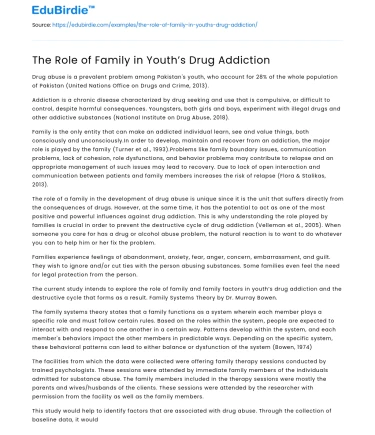Drug abuse is a prevalent problem among Pakistan's youth, who account for 28% of the whole population of Pakistan (United Nations Office on Drugs and Crime, 2013).
Addiction is a chronic disease characterized by drug seeking and use that is compulsive, or difficult to control, despite harmful consequences. Youngsters, both girls and boys, experiment with illegal drugs and other addictive substances (National Institute on Drug Abuse, 2018).
Save your time!
We can take care of your essay
- Proper editing and formatting
- Free revision, title page, and bibliography
- Flexible prices and money-back guarantee
Family is the only entity that can make an addicted individual learn, see and value things, both consciously and unconsciously.In order to develop, maintain and recover from an addiction, the major role is played by the family (Turner et al., 1993).Problems like family boundary issues, communication problems, lack of cohesion, role dysfunctions, and behavior problems may contribute to relapse and an appropriate management of such issues may lead to recovery. Due to lack of open interaction and communication between patients and family members increases the risk of relapse (Flora & Stalikas, 2013).
The role of a family in the development of drug abuse is unique since it is the unit that suffers directly from the consequences of drugs. However, at the same time, it has the potential to act as one of the most positive and powerful influences against drug addiction. This is why understanding the role played by families is crucial in order to prevent the destructive cycle of drug addiction (Velleman et al., 2005). When someone you care for has a drug or alcohol abuse problem, the natural reaction is to want to do whatever you can to help him or her fix the problem.
Families experience feelings of abandonment, anxiety, fear, anger, concern, embarrassment, and guilt. They wish to ignore and/or cut ties with the person abusing substances. Some families even feel the need for legal protection from the person.
The current study intends to explore the role of family and family factors in youth’s drug addiction and the destructive cycle that forms as a result. Family Systems Theory by Dr. Murray Bowen.
The family systems theory states that a family functions as a system wherein each member plays a specific role and must follow certain rules. Based on the roles within the system, people are expected to interact with and respond to one another in a certain way. Patterns develop within the system, and each member's behaviors impact the other members in predictable ways. Depending on the specific system, these behavioral patterns can lead to either balance or dysfunction of the system (Bowen, 1974)
The facilities from which the data were collected were offering family therapy sessions conducted by trained psychologists. These sessions were attended by immediate family members of the individuals admitted for substance abuse. The family members included in the therapy sessions were mostly the parents and wives/husbands of the clients. These sessions were attended by the researcher with permission from the facility as well as the family members.
This study would help to identify factors that are associated with drug abuse. Through the collection of baseline data, it would also help the society and practitioner for the proper design of treatment plan.
The present study aimed to explore the role of family in youth’s drug addiction, but there are a few limitations of the study that must be taken into consideration. The present study is focused only on the role of family, not taking into consideration the role of peers of the addicted individual. The participants were all from a rehabilitation centre; therefore, it is not representative of all drug abusers in the country.






 Stuck on your essay?
Stuck on your essay?

